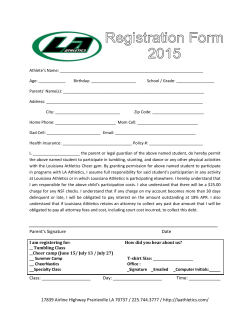
Ch. 9, Sec. 2 Handout
Chapter 9, Section 2 (Pages 280–285) The Louisiana Purchase Essential Question How did the Louisiana Purchase affect the nation’s economy and politics? Directions: As you read, complete a chart like the one below to explain how the Louisiana Purchase affected the nation’s economy and politics. Effects of the Louisiana Purchase Copyright © Glencoe/McGraw-Hill, a division of The McGraw-Hill Companies, Inc. 1. Economy Western Territory Why did settlers carry guns and axes on their journey? Chapter 9, Section 2 2. Politics (pages 281–282) In the early 1800s, American settlers filled Conestoga wagons with guns, axes, and other belongings and headed west to look for land and adventure. Conestoga wagons were sturdy vehicles topped with white canvas. In 1800 the territory of the United States went only as far west as the Mississippi River. The area to the west of the river was known as the Louisiana Territory. It was owned by Spain. New Orleans was on the southern edge of the territory. Spain allowed Americans to sail on the lower part of the Mississippi River and trade in New Orleans. This agreement was vital so that western farmers could ship their crops to markets. In 1802 Spain changed its policy and no longer allowed American goods to move into or out of New Orleans. Jefferson learned that Spain and France had made a secret agreement to hand over the Louisiana Territory to France. Jefferson was afraid that France might stop American trade on the Mississippi River. He authorized the minister to France to offer as much as $10 million for New Orleans and West Florida. 91 The Nation Expands What were three goals of the Lewis and Clark expedition? 1. 2. 3. What were the results of Lewis and Clark’s expedition? France’s leader, Napoleon Bonaparte, had plans to build an empire in the Americas. It would be based in Santo Domingo, which is now Haiti. But rebels took control of Santo Domingo, and Napoleon gave up his plans. France needed money to pay for a war with Britain. Napoleon offered to sell the entire Louisiana Territory to the United States. The purchase would provide cheap land for farmers and would give the United States control of the Mississippi River. The purchase of the territory was approved in 1803. It cost $15 million and doubled the size of the United States. Jefferson convinced Congress to pay for an expedition to explore the Louisiana Territory. He wanted to learn about plants and animals there and find locations for forts. He also hoped to find the fabled “Northwest Passage” that would allow a more direct route to Asia. Meriwether Lewis and William Clark were hired to lead the expedition. Both were amateur scientists who had experience with Native Americans. They assembled a crew of expert river men, scouts, gunsmiths, carpenters, a cook, and two interpreters. The expedition left St. Louis in the spring of 1804. Along the way, a Shoshone woman, Sacagawea, joined their group as a guide. After 18 months and almost 4,000 miles (6,437.4 km), the group reached the Pacific Ocean. They had collected important information about the people, plants, animals, and geography of the West. Their journey inspired people to move westward. Lieutenant Zebulon Pike led two more expeditions. He explored the upper Mississippi River valley and present-day Colorado. He found the mountain now known as Pikes Peak. He also explored the Great Plains, the Rocky Mountains, the Rio Grande, and what is now southern Texas. Many Federalists were against the Louisiana Purchase. They were afraid that new states that developed in the territory would become Republican. A group of Federalists in Massachusetts planned to secede, or withdraw from the Union. They knew that they needed New York’s support. They turned to Aaron Burr for help. Alexander Hamilton accused Burr of plotting treason. When Burr lost the governor’s race in New York, he blamed Hamilton. He challenged Hamilton to a duel. During the duel, Burr shot Hamilton and then fled to avoid arrest. Chapter 9, Section 2 Copyright © Glencoe/McGraw-Hill, a division of The McGraw-Hill Companies, Inc. 92 (pages 283–285) Wrap -Up Answer these questions to check your understanding of the entire section. 1. Theorizing Why do you think Sacagawea was chosen as a guide for Lewis and Clark? 2. Determining Cause and Effect Why was Napoleon willing to sell the entire Louisiana Territory to the United States? Copyright © Glencoe/McGraw-Hill, a division of The McGraw-Hill Companies, Inc. Assume that you are a Federalist living in Massachusetts. Decide whether you are for or against seceding from the Union. In the space provided, write a letter to other Federalists to convince them to support your position. Chapter 9, Section 2 93
© Copyright 2025










